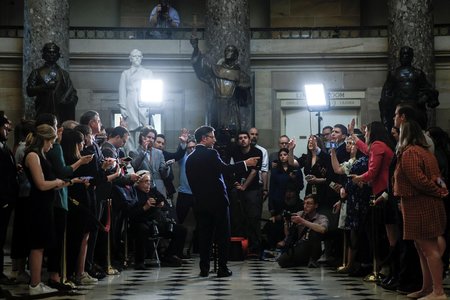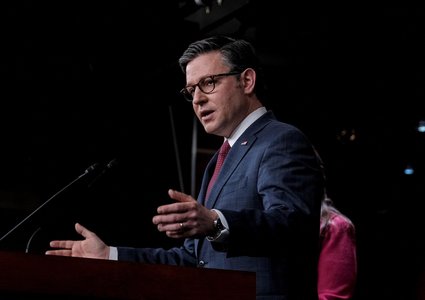The panelists discussed President Trump’s attacks on Amazon along with the latest updates in the ongoing Russia probe. Panelists also discussed Facebook founder Mark Zuckerberg’s upcoming appearance before Congress to address recent data misuse.
The panelists discussed President Trump’s attacks on Amazon along with the latest updates in the ongoing Russia probe. Panelists also discussed Facebook founder Mark Zuckerberg’s upcoming appearance before Congress to address recent data misuse.
Notice: Transcripts are machine and human generated and lightly edited for accuracy. They may contain errors.
ROBERT COSTA: Hello. I’m Robert Costa. And this is the Washington Week Extra , where we pick up online where we left off on the broadcast.
Joining me around the table, Kayla Tausche of CNBC, Michael Scherer of The Washington Post , Geoff Bennett of NBC News, and Susan Glasser of POLITICO .
President Trump continued to wage war against Amazon this week as the Defense Department considers granting the company a multibillion-dollar cloud computing deal. In a Twitter tirade, Mr. Trump accused Amazon of costing the U.S. Postal Service “massive amounts of money” at the expense of taxpayers and brick-and-mortar retailers. But the former postmaster general released a statement that the Amazon contract is actually profitable. Let’s remind everyone that Amazon’s founder, Jeff Bezos, also owns The Washington Post , where I’m a reporter and Michael’s a reporter. Geoff, this is the president being populist? Is it the president doing what?
GEOFF BENNETT: It’s the president, I think, using Amazon as a proxy for him to attack The Washington Post for coverage of his administration that he views as unfair. So this is a situation in which you have the president conflating Jeff Bezos’ dual role as the owner of The Washington Post and Amazon CEO, although the two are two completely separate entities.
And you mentioned the – sort of the financial picture of the Postal Service. Yes, the Postal Service has been – has been losing money year over year, in large part because it has to pay out billions of dollars in retirement obligations. But interestingly, package shipping is like the bright spot of the Postal Service’s financial picture, to which Amazon contributes a great deal. And as you rightly point out, a source familiar told me that when the Postal Service writes these kinds of deals, as they did with Amazon, the deal itself is kept private, but by law they have to be written in such a way where the deal is profitable for the Postal Service. So the president’s assertion that somehow Amazon is scamming the post office is just completely without merit.
SUSAN GLASSER: Well, I mean, he’s been told, you know, time and time again, apparently, according to very good reports that have emerged this week, that his facts were not accurate. He’s been briefed extensively because apparently this has really been on his mind not just in the last week, but for a long time. So he brings it up, his aides go over it, they try to explain it to him. He is resistant to facts he does not want to hear, and I think that’s a pattern we’ve seen for a long time. It’s clearly a pattern in regards to The Washington Post and Jeff Bezos.
KAYLA TAUSCHE: An important piece of context here, too, is that some of Trump’s very best friends are real-estate magnates just like him who are mall operators, whose cornerstone tenants have been affected by the switch to online retail that a lot of consumers have been preferring for decades at this point. And that’s more a function of consumer behavior versus anything wily that Amazon is actually doing. But politically, Amazon has this big HQ2 coming up. It has 50,000 jobs to award to any city. Perhaps now they focus a little bit more on maybe the Southern Sun Belt states in their search to see if they could curry some favor with the president or with his base instead of, say, Boston or Chicago.
MICHAEL SCHERER: You know, the president sort of is projecting here, I think. He has a great-man view of the world: great men decide things, I’m a great man. I don’t think he would ever buy a newspaper if he didn’t intend to use it for his own advantage, so he can’t really imagine the idea that someone else had purchased a newspaper and wasn’t using it for their advantage. And so I think he’s just refusing to see the facts, but also this serves his purpose just fine. This is an extension of, you know, attacks on a number of networks and attacks on a number of other newspapers, that he just needs his sort of daily chum to keep the narrative of the news cycle going for him.
MR. COSTA: Speaking of the Post , my colleague Carol Leonnig and I reported this week that the special counsel, Robert Mueller, has told President Trump’s legal team that he is a subject, but not a criminal target in the probe at this point. Mueller is pushing for an interview with the president amid all these discussions. He’s also reportedly compiling a report, a document on the president’s actions, his conduct in office, including his decision to fire former FBI Director James Comey. The president talked about his relationship with Russia this week during a meeting with members of his Cabinet at the White House.
PRESIDENT DONALD TRUMP: (From video.) Probably nobody’s been tougher to Russia than Donald Trump. Getting along with Russia would be a good thing, not a bad thing, and just about everybody agrees to that except very stupid people.
MR. COSTA: Mueller’s investigators have also questioned at least two Russian oligarchs who have traveled to the U.S. and asked them about Russian election meddling, specifically whether they donated money to political campaigns even indirectly using U.S. citizens or organizations as the middleman. It’s illegal for foreign citizens to donate to U.S. political campaigns.
There’s the Mueller news, but there’s also Mueller’s making a lot of efforts to bring in some of these Russian figures. As someone who studies foreign affairs and reports on it, what do you make of these oligarchs now coming into the investigation’s scope?
MS. GLASSER: Well, look, first of all, one of the questions that we’ve always had about Donald Trump and his connections with Russia is, A, is there a financial trail that directly connects Donald Trump with any of these figures? B, as we know, Paul Manafort, who was the chairman of the Trump campaign, has a long history, a long relationship with many Russian figures, including Oleg Deripaska, the Russian oligarch who was actually just today on a long list of Russians who were finally and very belatedly sanctioned as a result of the 2016 election meddling. And so you have this real conundrum, right? You have the Russiagate investigation hurtling down this way. We don’t know exactly where Mueller is headed with it. Clearly, there are lots of tantalizing Russian trails still to be investigated. On the other hand you have the question of what is our actual policy toward Russia, and you saw the clip of Donald Trump saying only very stupid people believe that he hasn’t been the toughest president ever on Russia. Well, I know a lot of people who aren’t very stupid who question whether Donald Trump supports the policy – the relatively tough policy of his administration when it comes to Russia. And so they imposed these sanctions today; I’ve heard nothing but praise for them across the spectrum of Russia observers. What I didn’t hear was anything from Donald Trump himself. He didn’t tweet about these sanctions. He didn’t talk about these sanctions. And, you know, there’s a real question from all the reporting about what’s gone on inside the administration whether he supports it.
MR. COSTA: Well, I mean, Sarah Huckabee Sanders was pressured about this – she was asked about it today at the news conference at the White House. But you do have John Bolton coming in as the new national security adviser; Friday was the last day for H.R. McMaster, leaving as the NSA. Is this administration changing its tune at all?
MR. BENNETT: It could. And the question I keep coming back to is what accounts for the president’s conspicuous silence, right? The Trump administration says that the president wants to enjoy sort of good personal relations with Vladimir Putin. Although when he says that no one has been tougher than he has, on its face it sounds preposterous but in a way he has a point. You have the expulsion of those 60 diplomats believed to be covert spies by U.S. officials, the most expelled diplomats at any time since the Cold War. You have now to date, what, sanctions against 100 – nearly 140 Russia-related individuals and entities. So, yes, the Trump administration has taken a very aggressive stance. But yet, that’s not matched at all by the president’s rhetoric.
MR. SCHERER: And also, you’ve had three officials in public issue public warnings about the U.S. not taking tough enough action. McMaster on his way out gave a speech, Tillerson on his way out mentioned Russia in his remarks, and the head of the National Security Agency Mike Rogers also mentioned in testimony on the Hill that more probably should be done. So the president’s own claim there is not backed up by his own staff.
MS. GLASSER: And if anything, I would say that having these sanctions come out today on H.R. McMaster’s last day was not a coincidence, shall we say, that it was really his final act in government. And his farewell speech on Tuesday, he came out and said not only has the United States not done enough, he said we failed. We failed, in both Obama and Trump.
MS. TAUSCHE: Well, the tranches of these sanctions were spurred, in part, by the bill that Congress passed last summer for sanctions on Russia, Iran, and North Korea. And the president was on the record signing that begrudgingly. And at the time, he said that he believed that that bill encroached on his executive negotiating authority. He did not want to sign that bill. And he was not coy about not wanting to do that. So while it might be accurate that the Trump administration has been incredibly harsh on Russia, and has levied sanctions and expulsions to the effect that we haven’t really seen, the president himself has been silent, and conspicuously so.
MR. COSTA: And about my story with Carol Leonnig, the most – the thing that prompted us to even start poking around is just – the most interesting thing to me is: Does the president sit down with Mueller or not in the coming weeks? And there is so much debate inside this White House, around the president, outside of the White House, about whether it’s smart to do that or not. We’ll keep an eye on that.
Another big story this week, bad news for Facebook. Data for 87 million users may have been accessed by Cambridge Analytica, a political consulting firm used by the Trump campaign during the 2016 election. Facebook founder Mark Zuckerberg announced in a post that the company is now putting stronger rules in place for campaign ads and will verify the identity and location of all organizations who want to place ads in the future. The company will also begin limiting the amount of data that can be harvested by outside businesses to better protect users’ personal data from future abuse. Zuckerberg is scheduled to testify before Congress next week. What do we expect to hear from Zuckerberg?
MR. BENNETT: Well, for one thing, he can’t be defensive, right? We know that much. And he has to give account for the huge lapse that happened on his watch. And certainly Democrats, we know for sure, have a lot of questions about not just what happened with Cambridge Analytica, but him providing some assurances that it won’t happen again.
MR. COSTA: How bad has Facebook been hurt?
MS. TAUSCHE: Extremely bad. And I think you’ll see that in the Democrats’ line of questioning. I think that this is akin to where the banks were during the financial crisis.
MR. COSTA: Really?
MS. TAUSCHE: Facebook specifically, because you had questions then about whether those companies were too big to fail and too big to be managed. And you have companies like Facebook, Google even, who are working on satellites and hot air balloons to bring internet to Mongolia, but their core product is like Swiss cheese and they can’t effectively police what’s happening here in the United States.
MR. COSTA: Could they become utilities at some point, or something like that?
MS. TAUSCHE: Potentially. There was one comment by Adam Schiff, who of course is the top Democrat on the House Intelligence Committee, after a hearing where the general counsels were present in October. And he said: These companies need to focus less on profit and more on actually basically scrubbing themselves of any ill activity.
MR. SCHERER: I think the thing to pay attention to in the hearings next week is how much of this was policy at Facebook and how much of this was something that happened without them knowing? I think a lot of it will turn out to have been policy. For instance, scraping public profiles, this is stuff that Facebook knew was going on, allowing academic researchers to get enormous amounts of information. That was something that Facebook knew was going on.
You know, for years, you could create pages that would allow you access if someone voluntarily signed in – the Obama campaign did this in 2012 or ’(0)8, I don’t remember which – that allowed you – if you signed in you would get access not only to that person, but all their friends. That was Facebook policy. It wasn’t an accident. It was like a hacking that was done by these companies.
And what’s coming due for Mark Zuckerberg is his vision of a sort of open internet where everyone’s friends with everyone else and everyone shares all their information and it’s all personally identifiable really did have a dark, seedy underbelly. And he didn’t acknowledge it soon enough.
MS. GLASSER: Well, I think your point is so well taken about the fact that this was policy. And by the way, that it was a company and that they were happy to collect your money, and to collect the Obama campaign’s money and the Trump campaign’s money. Sheryl Sandberg, to me, gave this extraordinary statement this week where she said, well, I guess we were just too idealistic of a company. (Laughter.) And I thought, am I the only person hearing it this way? This strikes me as remarkably deaf to what’s actually going on here. This was a corporation acting to maximize its profits. And we were the product that they were selling, and access to us. So it’s not like people came and said, wow, we can find ways to use this data. They were selling access to our data and our information.
MR. SCHERER: And it goes way beyond Facebook. The entire business model of the internet is selling your information and giving you services in return. And people don’t understand how much information is collected on them, who’s being sold it, and how that works.
MR. BENNETT: That’s a great sort of cautionary takeaway. Any sort of online platform you use for free, be warned that you and your data are the product.
MR. SCHERER: Yes.
MR. COSTA: We’ll leave it there. That’s it for this edition of the Washington Week Extra . While you’re online, check out my reporter’s notebook this week on the legacy of the Reverend Martin Luther King and RFK, Bobby Kennedy, and how their words remain relevant 50 years after their passing.
I’m Robert Costa. See you next time.










© 1996 - 2024 WETA. All Rights Reserved.
PBS is a 501(c)(3) not-for-profit organization